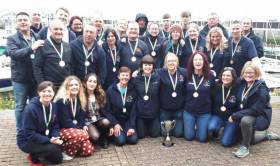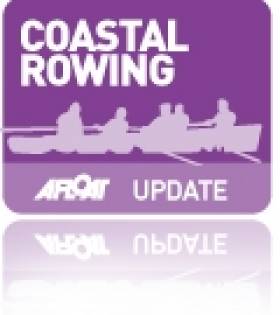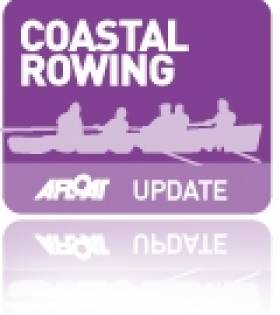Displaying items by tag: Celtic Challenge
As Afloat previously reported here, on the May bank holiday weekend (3rd to 6th of May), St. Michael’s Rowing Club Dún Laoghaire participated in the world’s longest true coastal rowing race, the Celtic Challenge, making their way from Arklow to Aberystwyth on the Welsh coast, covering a distance of 90 nautical miles. The two crews set off at 11.50am on Sunday and rowed through the night to reach Wales at 6.59am and 8.24am respectively on Monday morning.
For the skiff crew, Captained by Stephen Ring, making it across the line in 20h and 34min meant the realisation of a dream that started four years ago.
‘’We started training for the 2016 Challenge in October of 2015,’ Stephen Ring said. ‘’When the 2016 event was cancelled due to adverse weather, many of those disappointed resolved to try again for the 2017 race. Having battled through the night, the skiff crew were within a few miles of the shore when their tiller broke and they were forced to abandon the race. But 2019 was our year, and the 8 men and 4 women made sure that every stroke was an honest stroke and brought the St. Michael over the line to achieve that dream.’
Jake Byrne, the youngest male rower in the boat was part of the 2017 crew. ‘’Last time we came so close. So close. But this year, I was determined that nothing was going to stop us. We even brought an extra tiller with us, just in case.”
The all female crew entered the race as defending champions. And defend they did. They powered through the night, finishing the race in 19h and 9min, and brought the cup back to Dún Laoghaire.
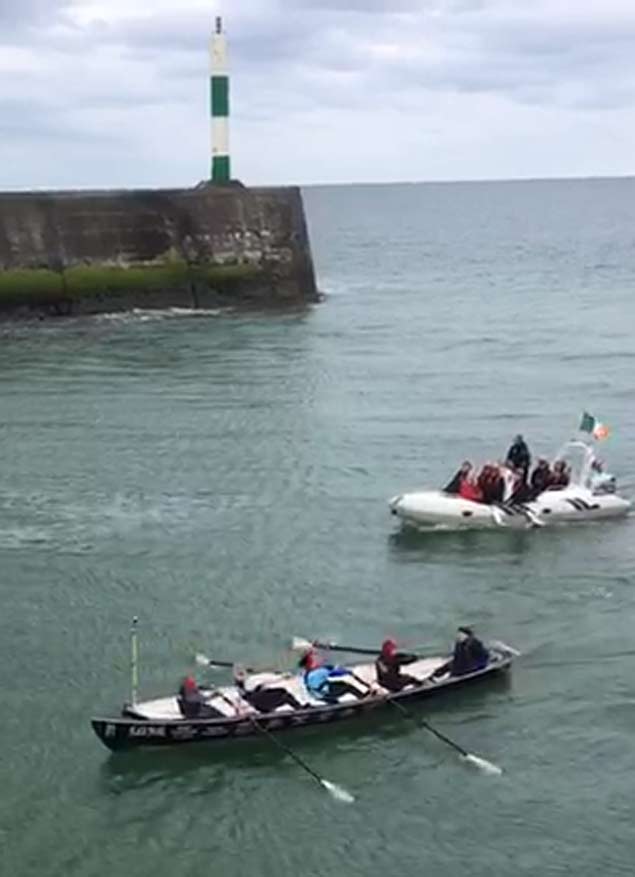 The Celtic Longboat crew crossing the finish line, with the rest of the crew close behind in the rib
The Celtic Longboat crew crossing the finish line, with the rest of the crew close behind in the rib
‘’We entered the race determined to win it, said Nicola Fitzgerald, Captain of the all female crew. ‘’We entered as a crew of 12 strong women, eager to support each other and to give everything we had. I am so proud of each of these amazing ladies, and honoured to have been their Captain through this amazing achievement. In the middle of the night, when tiredness set in, the thing that kept us going was the thought that we wanted to clock up as many miles as possible to make it easier for the next crew of four to row. We were rowing for each other, and that is not only a testimony of the spirit of the St. Michael’s club, but also of what it means to be women in sport.”
Amy Smith, the all female crew Vice-Captain said: ‘’It took 26,438 strokes to cross the Irish Sea. Our crew rowed 161.97km at an average rate of 23 strokes per minute and 7 meters per stroke. We coxed ourselves, we rowed our best and we retained our title.”
The 24 rowers were supported by two boats and two ribs. The mixed skiff crew was supported by the yacht ‘Bod’ skippered by Derek De Jong, with Michael Nolan as crew. Their rib was the ‘Niamh’ with Clive Skelly as main driver, and Mark Donnelly and Barry Aston as crew. The Celtic Longboat was supported by ‘Joe’s Buoy 2’, skippered by Paul Morton, with Brendan McLaughlin as crew and Assumpta Doherty as assistant. Their rib was the ‘Father Jack’ with Kirstan O’Toole as main driver, and Jack O’Farrell O’Toole and Isaac Matthews as crew.
‘’We could not have done it without our amazing support crews,” said Mark Crockford, who completed the Challenge in the St. Michael’s skiff. ‘’They kept us going. They were there for us. Literally.” Sarah Lovejoy, also from the skiff crew said: ‘’This is the first time I have completed the Challenge, and I am so grateful to this fantastic support team for putting up with the cold, and the waves and lack of sleep to help us achieve our dream.”
Liz O’Toole, who rowed in the Longboat, not only was grateful but also took pride in the support team for her crew. ‘My sons, Kirstan and Jack, were out there, doing the Challenge with me. They were not rowing; instead they were in the rib, which was named after my father, making sure that the ladies were safe during all the transfers to the row boat and back. I simply could not be more proud of them. The same goes for Paul Morton; without his generosity and leadership we could not have been so successful.”
The St.Michael’s rowers took on the Challenge in aid of the RNLI and the club, and their sponsors include Newstalk, Jones Engineering and Healthy Ireland. ‘’We would like to thank everyone who has donated so far, not only sponsors but our family and friends,” said Vincent Scully, member of the fundraising team for the Challenge.
James Tedd, the Club’s Chairperson said ‘’We are very proud of all our rowers. Well done to them and well done to all the crews that entered this year. A special Thank You! goes to Newquay Rowing Club for lending us the Celtic Longboat, the Black Pearl. We are very grateful to the Celtic Challenge organising committee for their efforts and efficiency. Roll on 2021!”
#celticchallenge – Over the May bank holiday weekend (2nd-5th May), St Michael's Rowing Club have teamed up with charity GOAL to send twp crews across the Irish Sea to participate in the biennial 'Celtic Challenge'. The race sets off from Arklow, Co. Wicklow with the finishing line in Aberystwyth, Wales. At 150km, this relay race is billed as the longest 'true' rowing race in the world. Both teams are taking on this challenge to raise funds in aid of the people of the Philippines and a much needed skiff for St. Michael's Rowing Club, Dun Laoghaire.
We urgently need help in finding support boats and a support rib for the challenge. The support vessel must not be less than 10m in length and the powered RIB not less than 4m in length. If you have a yacht, licensed angling or dive boat, pleasure cruiser and would be willing to come along for what will be a memorable journey, please get in touch.
For an information pack on the event please contact; Gareth Whittington on 086 044 7241
Cold Wind, Huge Swells, Blisters, Exhaustion, Elation...The Toughest Celtic Challenge Ever
#COASTAL ROWING – During the May bank holiday weekend (4th-6th May), 12 men and women of St Michael's Rowing Club, Dun Laoghaire, participated in the biennial rowing race across the Irish Sea known as 'the Celtic Challenge'. It turned out to be what is widely regarded as the toughest crossing in the race's 19 year history, with just 12 of the 23 teams entered crossing the finish line unaided. St. Michael's finished 12th in the longest time ever taken for the 150km course – 27hrs, 18 mins, 21 seconds. The relay race is billed as the longest 'true' rowing race in the world and is listed as such in the Guinness Book of Records.
The run up to the event was challenging in itself with the team working tirelessly to secure a replacement support boat due to damage to the mast of the yacht that had already been confirmed. With just two days to departure, all the pieces of the puzzle were in place.
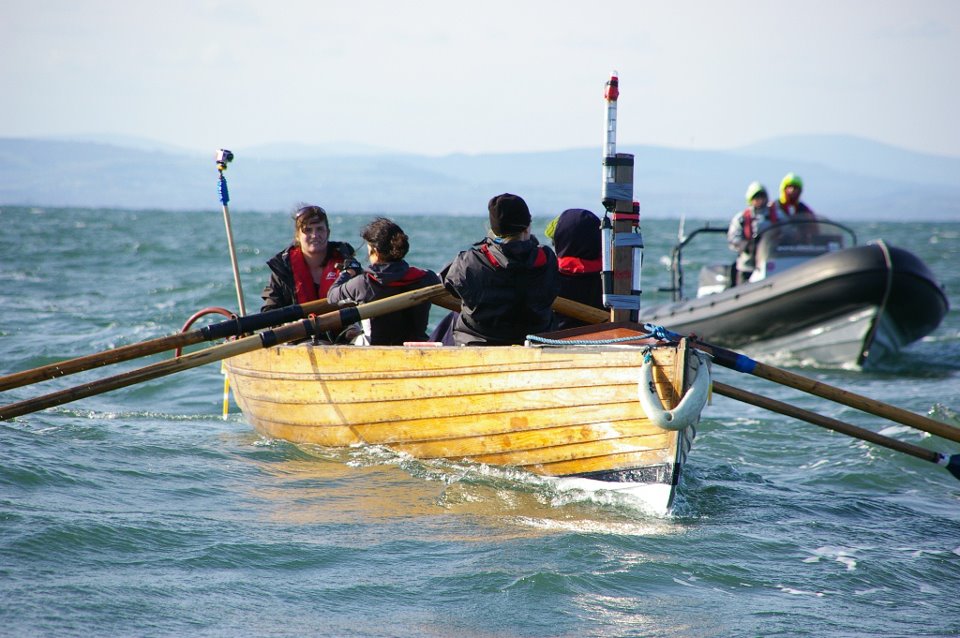
Pushing hard with a safey RIB keeping a watchful eye
Due to poor weather conditions, the race was postponed a number of times and eventually set off from Arklow, Co. Wicklow on Saturday 5th May at 4pm. Very soon after the start, the team from Bray Rowing Club who were rowing the only other traditional east coast skiff in the race had pulled out due to damage to their support boat, meaning that St. Michael's were the only wooden boat left in the race.
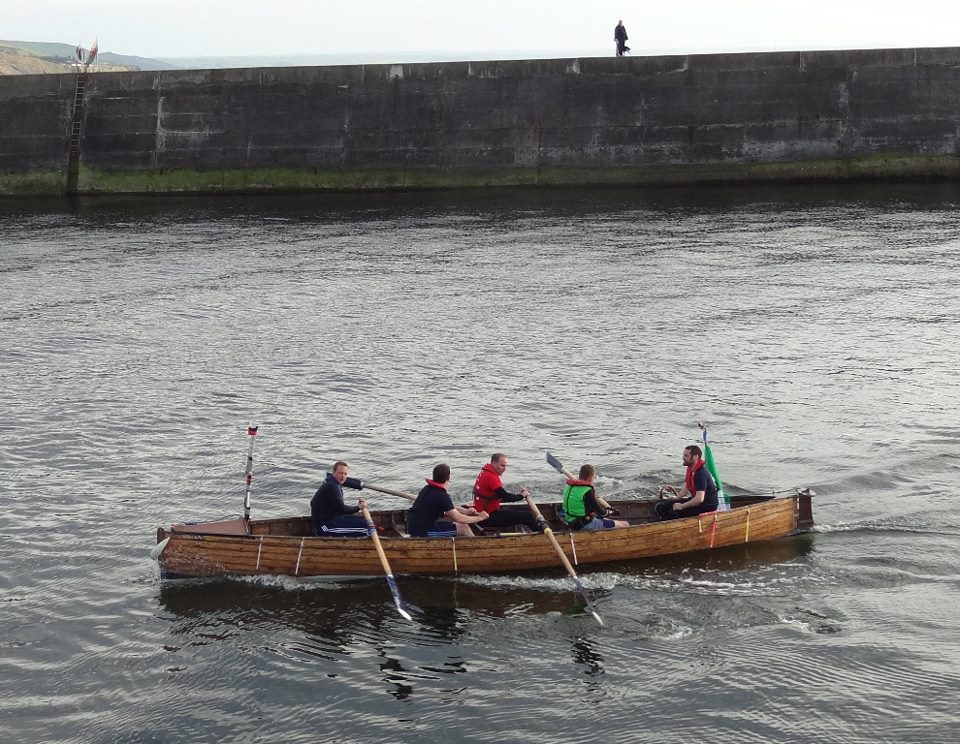
Over the line in Aberystwyth
The format of the race is a relay. Each team has 3 crews of 4 rowers that rotate their time on the oar, resting and refuelling on an accompanying support boat. Generally 'one hour on, two hours off' is the rule of thumb, but conditions, strategies, injuries, and sickness may dictate otherwise. The first 6 hours were the toughest and most challenging physically, as the northeast wind and swells created extremely challenging conditions for the participating rowers. The start was choppy and the Arklow Bank lived up to its reputation of being an extremely tough obstacle, but St. Michaels' quarter-ton clinker built skiff was well suited to the conditions. The solid wood oars used are three times heavier than carbon fibre equivalents used by all other teams, requiring strength and a particular technique even in normal conditions.
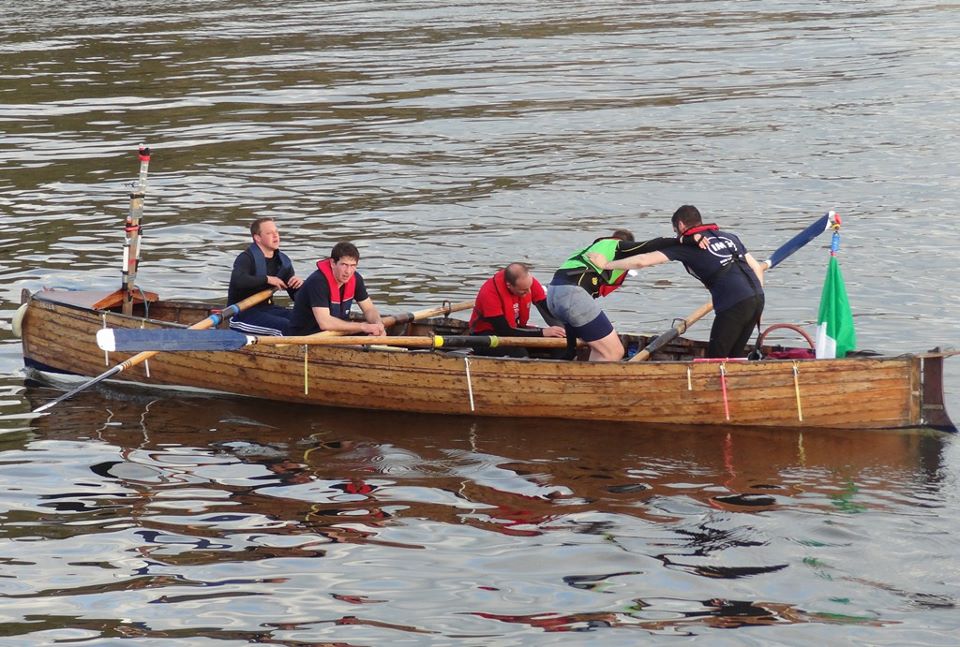
Exhausted but delighted
As the sun set, the crew knuckled down to what would be a tough, night-time row with changes of crew every hour. Their support yacht, the Helcia and the crew of the rib, the Wizard worked tirelessly to ensure the safety of the teams during the changeovers, both crewed by quite remarkable and extreme professionals, who gave freely of their time to the cause and to whom the club is eternally grateful. Working in two to three metre swells made rowing tough, and required 100% concentration and complete focus.
As the sun rose, it was clear the race was going to be a long one. Extreme conditions overnight meant teams hadn't travelled the distance they expected and knew they had to dig deep and work very closely as a unit to ensure spirits were kept high. As the changeovers continued and the hours flew by, the crew could see land, and somewhere in the distance was Aberystwyth. At this point, news of the night's retirements began to filter through on the VHF radio, with tales of other teams forced to pull out or turn back due to reasons including mechanical failure of support boats, sea sickness, damaged boats, lost rudders, and so on.
The final changeover was made at around 6.30pm on Sunday, and the pier could be clearly seen with cheering voices being carried on the wind. On the slip after the finish, the organisers and other crews were clearly impressed with the 30-year old 'Eileen' and her brave crew. At the awards ceremony the following day, St. Michael's became the first Irish team to be awarded the prestigious 'Spirit of the Celtic Challenge' trophy, which is given to the team which displays the greatest amount of endeavour when completing the course. This was a very proud moment for all the team as well as their friends, family, and all their clubmates back home in Dun Laoghaire.
First time Celtic Challenger was Wales born Gareth Whittington, now living in Dun Laoghaire told us, "I was told you never know what to expect as each Celtic Challenge is different because of the changing weather conditions, but I cannot and will not ever forget the way we pulled together as a team to ensure we got to Aberystwyth, an remarkable achievement".
Camaraderie between the Welsh and Irish clubs and teams involved is huge, but the team's thoughts that weekend were with the teams that did not make it, particularly their fellow Irish teams from Bray Rowing Club, Team Marie Keating, Ferrycarrig Rowing Club, and Airport Police and Fire Service Rowing Club. Congratulations are also due to the other Irish teams who crossed the finish line, Courtown, Foyle, and Arklow Rowing Clubs, the latter two of which won their respective categories.
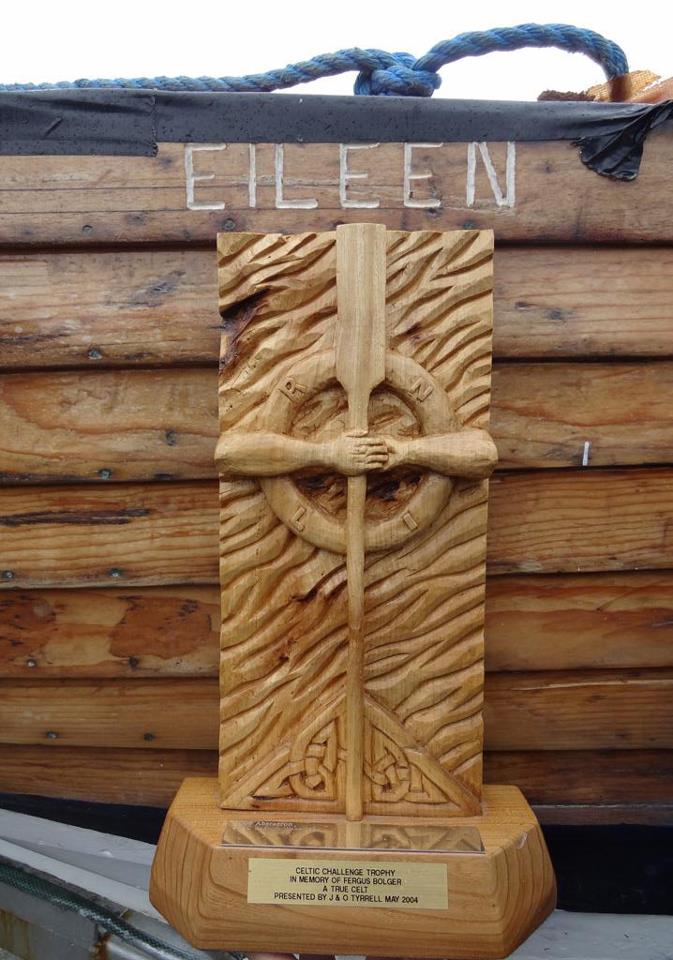
Spirit of the Celtic Challenge Award
St. Michael's participated in the Celtic Challenge to actively seek sponsorship, in a drive to raise funds towards new clubhouse facilities in Dun Laoghaire Harbour. Currently, the club lacks space to store their three wooden boats, space for indoor training, and is without changing facilities for the men, women and children who row for the club. It is hoped that the money raised can be put towards achieving this long-standing goal and keep the club's traditions and the tradition of the Celtic Challenge alive.
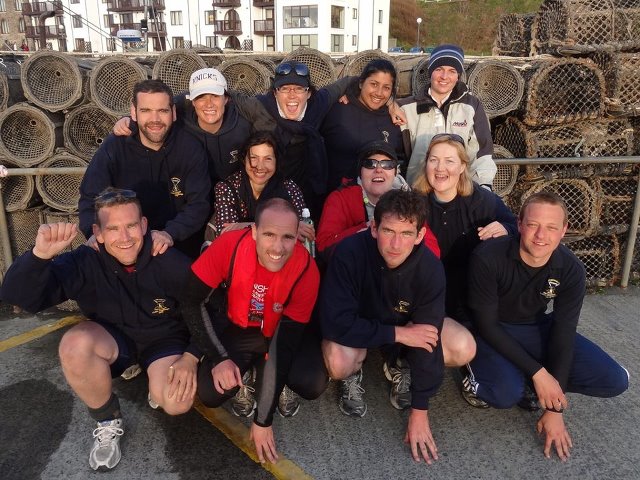
St. Michael's 2012 Celtic Challenge crew


























